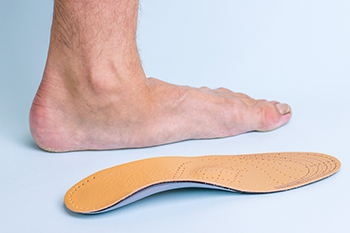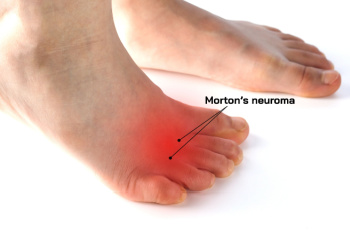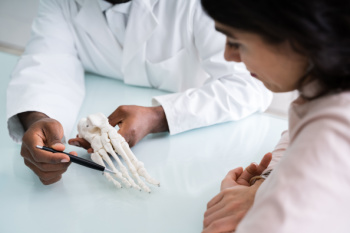Connect With Us
Blog
Items filtered by date: March 2024
Flat Feet and Orthotics

Flat feet, or pes planus, is a condition where the arches of the feet collapse, resulting in the entire sole of the foot being in contact with the ground. This can lead to various issues such as foot pain, arch strain, heel pain, and even knee, hip, and lower back problems due to altered biomechanics. Custom-made orthotics are often prescribed as a solution for flat feet. These orthotic devices are tailored to the individual's foot structure and biomechanics, providing support and alignment to address the underlying causes of flat feet. There are different types of orthotics available, including rigid orthotics that offer maximum support and control, semi-rigid orthotics that provide a balance between support and flexibility, and soft orthotics that offer cushioning and shock absorption. By correcting foot alignment and redistributing pressure, custom orthotics can alleviate symptoms associated with flat feet, improve foot function, and prevent or minimize the risk of further complications. If you have flat feet and they are interfering with your quality of life, it is suggested that you make an appointment with a podiatrist to see if orthotics can help provide correction and relief.
If you are having discomfort in your feet and would like to try orthotics, contact Dr. David Ungar from Personal Foot Care. Our doctor can provide the care you need to keep you pain-free and on your feet.
What Are Orthotics?
Orthotics are inserts you can place into your shoes to help with a variety of foot problems such as flat feet or foot pain. Orthotics provide relief and comfort for minor foot and heel pain but can’t correct serious biomechanical problems in your feet.
Over-the-Counter Inserts
Orthotics come in a wide variety of over-the-counter inserts that are used to treat foot pain, heel pain, and minor problems. For example, arch supports can be inserted into your shoes to help correct overarched or flat feet, while gel insoles are often used because they provide comfort and relief from foot and heel pain by alleviating pressure.
Prescription Orthotics
If over-the-counter inserts don’t work for you or if you have a more severe foot concern, it is possible to have your podiatrist prescribe custom orthotics. These high-quality inserts are designed to treat problems such as abnormal motion, plantar fasciitis, and severe forms of heel pain. They can even be used to help patients suffering from diabetes by treating foot ulcers and painful calluses and are usually molded to your feet individually, which allows them to provide full support and comfort.
If you are experiencing minor to severe foot or heel pain, it’s recommended to speak with your podiatrist about the possibilities of using orthotics. A podiatrist can determine which type of orthotic is right for you and allow you to take the first steps towards being pain-free.
If you have any questions please contact our office located in Farmington, MI . We offer the newest diagnostic and treatment technologies for all your foot and ankle needs.
Morton’s Neuroma and Ball of Foot Pain
 Morton's neuroma is a painful condition that affects the ball of the foot, primarily between the third and fourth toes. It occurs when the tissue around one of the nerves leading to the toes thickens, which can cause a sharp, burning pain in the foot. This thickening is often a response to irritation, pressure, or injury to the nerve. Patients commonly report feeling like they are stepping on a pebble or have a knot in their sock. Other symptoms include a burning sensation in the ball of the foot that may radiate into the toes, numbness, and tingling in the affected toes. These symptoms can get worse with certain activities that put pressure on the foot, like running or wearing high heels. Incorrect footwear that cramps the toes together can also contribute to the condition by putting additional pressure on the nerves in the foot. If you are experiencing pain in the ball of the foot, or suspect Morton’s neuroma, it is suggested that you schedule an appointment with a podiatrist for treatment options.
Morton's neuroma is a painful condition that affects the ball of the foot, primarily between the third and fourth toes. It occurs when the tissue around one of the nerves leading to the toes thickens, which can cause a sharp, burning pain in the foot. This thickening is often a response to irritation, pressure, or injury to the nerve. Patients commonly report feeling like they are stepping on a pebble or have a knot in their sock. Other symptoms include a burning sensation in the ball of the foot that may radiate into the toes, numbness, and tingling in the affected toes. These symptoms can get worse with certain activities that put pressure on the foot, like running or wearing high heels. Incorrect footwear that cramps the toes together can also contribute to the condition by putting additional pressure on the nerves in the foot. If you are experiencing pain in the ball of the foot, or suspect Morton’s neuroma, it is suggested that you schedule an appointment with a podiatrist for treatment options.
Morton’s neuroma is a very uncomfortable condition to live with. If you think you have Morton’s neuroma, contact Dr. David Ungar of Personal Foot Care. Our doctor will attend to all of your foot care needs and answer any of your related questions.
Morton’s Neuroma
Morton's neuroma is a painful foot condition that commonly affects the areas between the second and third or third and fourth toe, although other areas of the foot are also susceptible. Morton’s neuroma is caused by an inflamed nerve in the foot that is being squeezed and aggravated by surrounding bones.
What Increases the Chances of Having Morton’s Neuroma?
- Ill-fitting high heels or shoes that add pressure to the toe or foot
- Jogging, running or any sport that involves constant impact to the foot
- Flat feet, bunions, and any other foot deformities
Morton’s neuroma is a very treatable condition. Orthotics and shoe inserts can often be used to alleviate the pain on the forefront of the feet. In more severe cases, corticosteroids can also be prescribed. In order to figure out the best treatment for your neuroma, it’s recommended to seek the care of a podiatrist who can diagnose your condition and provide different treatment options.
If you have any questions, please feel free to contact our office located in Farmington, MI . We offer the newest diagnostic and treatment technologies for all your foot care needs.
The Importance of Podiatrists on Healthcare Teams

Podiatrists specialize in diagnosing and treating conditions related to the foot, ankle, and lower leg. Podiatrists play an important role on a healthcare team, as their specialty can help patients maintain and enhance mobility and overall quality of life. Podiatrists’ specialized knowledge of foot-related disorders ranges from common issues, such as ingrown toenails and bunions, to more complex conditions like diabetic foot and structural abnormalities. Podiatrists take a comprehensive approach to treatment, by conducting thorough assessments, implementing various treatment methodologies, and creating personalized care plans. Podiatrists not only address acute and chronic pain but also offer prevention techniques for various conditions. This is important care to receive for conditions that could result in mobility restrictions or more invasive treatments. Overall, podiatrists ensure that our feet, which bear the brunt of our daily activities, receive the specialized care necessary to keep us walking and running through life. If you’re experiencing any foot or ankle-related issues, it is suggested you add a podiatrist to your healthcare team.
If you are dealing with pain in your feet and ankles, you may want to seek help from a podiatrist. Feel free to contact Dr. David Ungar from Personal Foot Care. Our doctor can provide the care you need to keep you pain-free and on your feet.
What Is a Podiatrist?
A podiatrist is a doctor of podiatric medicine who diagnoses and treats conditions of the foot, ankle, and related structures of the leg. Your podiatrist may specialize in a certain field such as sports medicine, wound care, pediatrics, and diabetic care. Podiatrists have the ability to become board certified through training, clinical experience, and then taking an exam.
What Do Podiatrists Do?
On a daily basis, a podiatrist may perform the following activities:
- Diagnose foot ailments such as ulcers, tumors, fractures, etc.
- Use innovative methods to treat conditions
- Use corrective orthotics, casts, and strappings to correct deformities
- Correct walking patterns and balance
- Provide individual consultations to patients
It is very important that you take care of your feet. It’s easy to take having healthy feet for granted, however foot problems tend to be among the most common health conditions. Podiatrists can help diagnose and treat a variety of feet related conditions, so it is crucial that you visit one if you need assistance.
If you have any questions please feel free to contact our office located in Farmington, MI . We offer the newest diagnostic and treatment technologies for all your foot and ankle needs.
Wounds That Don't Heal Need to Be Checked
Osteoid Osteomas

A podiatrist can help diagnose and treat osteoid osteomas in the foot or ankle. These doctors can identify these benign, rare bone tumors and offer treatments like surgery or radiofrequency ablation, or RFA, to relieve pain. Surgery may require limited weight-bearing for a few weeks, while RFA does not have this restriction. Both methods effectively alleviate pain, with RFA often chosen when the tumor is seen on imaging tests. However, if the tumor is close to important nerves or blood vessels, RFA might not be an option. Podiatrists also consider the distance from the tumor to the cartilage to minimize damage during treatment. If you have foot pain that is persistent or worsening, it is suggested that you schedule an appointment with a podiatrist for an evaluation. A proper diagnosis can be made, and proper treatment administered, thereby helping you regain comfort and mobility.
Some foot conditions may require additional professional care. If you have any concerns, contact Dr. David Ungar of Personal Foot Care. Our doctor can provide the care you need to keep you pain-free and on your feet.
Rare Foot Conditions
The majority of foot conditions are common and can be treated by a podiatrist. Standard diagnostic procedures are generally used to identify specific conditions and treatment can be rendered. A podiatrist also treats rare foot conditions which can be difficult to diagnose and may need extra attention and care.
There are many rare foot conditions that can affect children. Some of these can include:
- Freiberg’s disease
- Kohler’s disease
- Maffucci syndrome
Freiberg’s disease - This can be seen as a deterioration and flattening of a metatarsal bone that exists in the ball of the foot. It typically affects pre-teen and teenage girls, but can affect anyone at any age. Symptoms that can accompany this can be swelling, stiffness, and the patient may limp.
Kohler’s disease - This often targets the bone in the arch of the foot and affects younger boys. It can lead to an interruption of the blood supply which ultimately can lead to bone deterioration. The patient may limp or experience tenderness, swelling, and redness.
Maffucci syndrome - This affects the long bones in a child’s foot leading to the development of abnormal bone lesions. They are benign growths and typically develop in early childhood and the bones may be susceptible to breaking.
A podiatrist can properly diagnose and treat all types of rare foot conditions. If your child is affected by any of these symptoms or conditions, please don’t hesitate to call our office so the correct treatment method can begin.
If you have any questions please feel free to contact our office located in Farmington, MI . We offer the newest diagnostic tools and technology to treat your foot and ankle needs.

